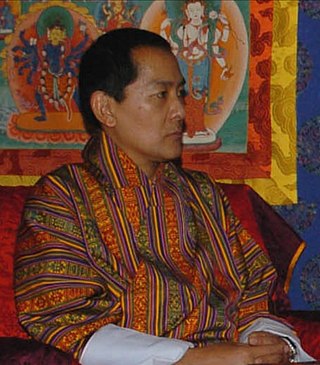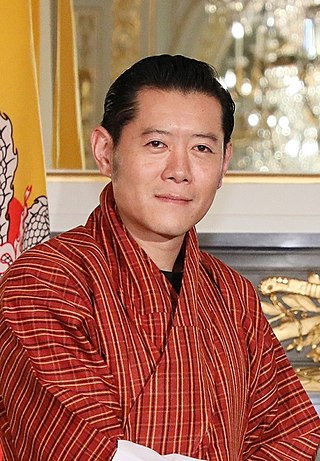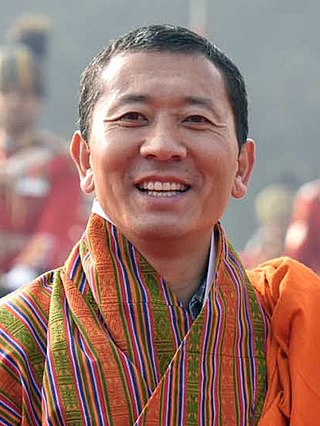
Bhutan's early history is steeped in mythology and remains obscure. Some of the structures provide evidence that the region has been settled as early as 2000 BC. According to a legend it was ruled by a Cooch-Behar king,Sangaldip,around the 7th century BC,but not much is known prior to the introduction of Tibetan Buddhism in the 9th century,when turmoil in Tibet forced many monks to flee to Bhutan. In the 12th century,the Drukpa Kagyupa school was established and remains the dominant form of Buddhism in Bhutan today. The country's political history is intimately tied to its religious history and relations among the various monastic schools and monasteries.

The Government of Bhutan has been a constitutional monarchy since 18 July 2008. The King of Bhutan is the head of state. The executive power is exercised by the Lhengye Zhungtshog,or council of ministers,headed by the Prime Minister. Legislative power is vested in the bicameral Parliament,both the upper house,National Council,and the lower house,National Assembly. A royal edict issued on April 22,2007 lifted the previous ban on political parties in anticipation of the National Assembly elections in the following year. In 2008,Bhutan adopted its first modern Constitution,codifying the institutions of government and the legal framework for a democratic multi-party system.

Jigme Singye Wangchuck is a member of the House of Wangchuck who was the king of Bhutan from 1972 until his abdication in favor of his eldest son,Jigme Khesar Namgyel Wangchuck,in 2006.

Jigme Dorji Wangchuck was the 3rd Druk Gyalpo of Bhutan.

LyonpoKhandu Wangchuk is a political figure in Bhutan. He graduated from St. Stephen's College,University of Delhi. He was Chairman of the Council from 2001 until 2002. On 7 September 2006,he became Prime Minister again;he was then replaced by Kinzang Dorji on 2 August 2007,after Wangchuk resigned to participate in the 2008 election as a member of the Druk Phuensum Tshogpa (DPT) political party. He also served as Minister of Foreign Affairs from 2003 to 2007.

LyonpoSangay Ngedup was Prime Minister of Bhutan from 1999 to 2000 and again from 2005 to 2006.

Jigme Khesar Namgyel Wangchuck is the Druk Gyalpo of the Kingdom of Bhutan. After his father Jigme Singye Wangchuck abdicated the throne in his favor,he became the monarch on 9 December 2006. A public coronation ceremony was held on 6 November 2008,a year that marked 100 years of monarchy in Bhutan.

The Wangchuck dynasty have held the hereditary position of Druk Gyalpo of Bhutan since 1907. Prior to reunification,the Wangchuck family had governed the district of Trongsa as descendants of Dungkar Choji. They eventually overpowered other regional lords and earned the favour of the British Empire. After consolidating power,the 12th Penlop of Trongsa Gongsar Ugyen Wangchuck was elected Druk Gyalpo,thus founding the dynasty. The position of Druk Gyalpo –who heads the royal family of Bhutan –is more commonly known in English as the King of Bhutan,however "Druk Gyalpo" would be translated literally as "Dragon King"
The development of Bhutanese democracy has been marked by the active encouragement and participation of reigning Bhutanese monarchs since the 1950s,beginning with legal reforms such as the abolition of slavery,and culminating in the enactment of Bhutan's Constitution. The first democratic elections in Bhutan began in 2007,and all levels of government had been democratically elected by 2011. These elections included Bhutan's first ever partisan National Assembly election. Democratization in Bhutan has been marred somewhat by the intervening large-scale expulsion and flight of Bhutanese refugees during the 1990s;the subject remains somewhat taboo in Bhutanese politics.

The following outline is provided as an overview of and topical guide to Bhutan:

The bilateral relations between the Himalayan Kingdom of Bhutan and the Republic of India have been traditionally close and both countries share a "special relationship",making Bhutan a protected state,but not a protectorate,of India. India remains influential over Bhutan's foreign policy,defence and commerce. Bhutan is the largest beneficiary of India's foreign aid.

The Kingdom of Bhutan and the People's Republic of China do not maintain official diplomatic relations,and relations are historically tense. The PRC shares a contiguous border of 470 kilometers with Bhutan,and its territorial disputes with Bhutan have been a source of potential conflict. Since the 1980s,the two governments have conducted regular talks on border and security issues to reduce tensions.

The judicial system of Bhutan is the purview of the Royal Court of Justice,the judicial branch of the government of Bhutan under the Constitution of 2008. The judicial system comprises the Judicial Commission,the courts,the police,the penal code,and regulations on jabmi (attorneys).

Tshering Tobgay is a Bhutanese politician,environmentalist,and cultural advocate who was the Prime Minister of Bhutan from July 2013 to August 2018. Tobgay is the leader of the People's Democratic Party,and was also the Leader of the Opposition in the National Assembly from March 2008 to April 2013.
Sir Raja Sonam Topgay Dorji CIE,also called Tobgay,was a member of the Dorji family and Bhutanese politician who served between 1917 and 1952 in the Royal Government under the First and Second Kings of Bhutan. During this period,Topgay Dorji officially held the posts of Gongzim,Deb Zimpon,and Trade Agent to the Government of Bhutan. As such,Topgay Dorji was responsible for fostering Anglo-Bhutanese relations,and later,Bhutan–India relations. Topgay's ties with the west and modernist political factions contributed significantly to the modern political landscape and modernization of Bhutan.

The Treaty of Punakha was an agreement signed on 8 January 1910,at Punakha Dzong between the recently consolidated Kingdom of Bhutan and British India. The Treaty of Punakha is not a stand-alone document,but represents a modification of the Treaty of Sinchula of 1865,the prior working agreement between Bhutan and British India. As such,the Treaty of Punakha is an amendment whose text incorporates all other aspects of the Treaty of Sinchula by reference.

National Assembly elections were held in Bhutan on 31 May and 13 July 2013. The result was a victory for the opposition People's Democratic Party (PDP),which won 32 of the 47 seats. The elections were the second general elections to occur in Bhutan since former King Jigme Singye Wangchuck ushered in democratic reforms.

Lotay Tshering is a Bhutanese politician and surgeon who is the current Prime Minister of Bhutan,in office since 7 November 2018. He has also been the president of Druk Nyamrup Tshogpa since 14 May 2018.

Tandi Dorji is a Bhutanese politician who has been Foreign Minister for Bhutan since November 2018. He has been a member of the National Assembly of Bhutan,since October 2018.
Austria–Bhutan relations refers to the international relations that exist between Austria and Bhutan.















